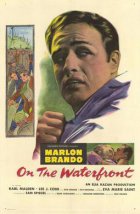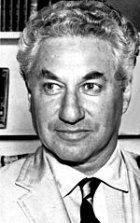
On the Waterfront
- NOT RATED
- Year:
- 1954
- 108 min
- 3,915 Views
FADE IN:
EXT—ESTABLISHING SHOT—WATERFRONT—NIGHT
Shooting toward a small building (Hoboken Yacht Club) set upon a wharf
floating about twenty-five yards off shore. A long, narrow gangplank
leads from the wharf to the shore, and on either side of the wharf are
large ocean liners which are being unloaded by arc light. In the B.G.
is the glittering New York skyline. A great liner, blazing with light,
is headed down river. A ferry chugs across to Manhattan. There is a
counterpoint of ships' whistles, some shrill, others hauntingly muted.
CLOSER SHOT—SMALL BUILDING—ON WHARF—NIGHT
It is the office of the longshoremen's local for this section of
waterfront. Coming along the gangplank toward the shore is an isolated
figure. He is TERRY MALLOY, a wiry, jaunty, waterfront hanger-on in his
late twenties. He wears a turtleneck sweater, a windbreaker and a cap.
He whistles a familiar Irish song.
A SERIES OF WALKING SHOTS—TERRY MALLOY—WATERFRONT—NIGHT
Reaching the shore and turning away from the union office. Passing the
burned-out piers.
Turning up a waterfront tenement street lit by a dim street lamp that
throws an eerie beam. He is holding something inside his jacket but we
cannot see what it is.
NOTE:
MAIN TITLES TO BE SUPERIMPOSED OVER THIS SERIES OF SHOTSEXT—WATERFRONT STREET—NIGHT
Terry walks along until he reaches an ancient tenement where he stops,
hesitates, looks up toward the top of the building, and putting his
fingers to his mouth lets out a shrill, effective whistle that echoes
up the quiet street. Then he cups his hands to his mouth and shouts:
TERRY:
Hey Joey! Joey Doyle!
MEDIUM SHOT—TENEMENT WINDOW—NIGHT
The window of a third-story room, from Terry's POV. JOEY DOYLE, a
youthful, rather sensitive and clean-cut Irish boy, pokes his head out
the window.
JOEY:
Terry?
(then a little suspiciously)
What do you want?
REVERSE ANGLE—WATERFRONT STREET—NIGHT
TERRY:
Hey look-
He reaches into his windbreaker in a gesture associated with drawing a
gun from a shoulder holster. But instead he draws out a live racing
pigeon. As he does so the bird makes an effort to escape and flaps its
wings, but Terry subdues it expertly and holds it up for Joey to see.
TERRY:
(somewhat uneasily)
—one of yours. I recognized the band.
CLOSE—ON JOEY AT WINDOW—NIGHT
There is a fire escape in front of it.
JOEY:
Yeah? Must be Danny-boy. I lost him in the
last race.
TERRY:
He followed my birds into their coop.
Here, you want him?
JOEY:
(cautiously)
Well I got to watch myself these days.
Know what I mean?
TERRY:
I'll bring him up to your loft.
JOEY:
(some what reassured)
I'll see you on the roof.
Joey closes the window and turns away.
EXT—MEDIUM CLOSE—TENEMENT—ON TERRY —NIGHT
Tensely, as if going through something he wishes he could avoid, Terry
looks in the direction of the tenement stoop and nods. Now for the
first time we see two men standing there under the doorway so that Joey
was unable to see them from his window. When Terry nods they enter the
tenement hallway; he takes a few steps forward so as to be out of sight
from Joey's widow. Then Terry raises the pigeon into the air and,
inexplicably, releases it. As it wings out of sight he turns and starts
up the street in the direction from which he came, walking crabwise as
if trying to see the effect of what he has just done. A soddenly drunk,
one-armed longshoreman, MUTT MURPHY, staggers toward him, singing in a
hoarse voice... .
MUTT:
(as if it were a dirge)
Tippi-tippi-tim, tippi-tim,
Tippi-tippi-tan, tippi-tan...
(He stumbles into Terry.)
Gotta dime for a crippled-up docker?
TERRY:
Go on, beat it!
MUTT:
A dime, Terry, a dime for a cup of coffee?
TERRY:
Don't give me that coffee, you rummy.
Now blow!
MUTT:
Thanks for nothing, you bum.
With a certain battered dignity, Mutt moves off, picking up his song,
"Tippi-tippi-tan, tippi-tan... ." Terry takes an anxious glance back
toward the tenement.
EXT—TENEMENT ROOFTOP—NIGHT
In the B.G. on the far shore is the New York skyline. In the M.G. a
ship is being unloaded on this side of the river. In the F.G. is a coop
of racing pigeons. Joey comes out on the roof and looks around. The
door f rom the tenement stairway creaks open and Joey turns.
JOEY:
Terry?
There is no answer. Joey is surprised.
JOEY:
That you, Terry?
Two men step out upon the roof, their faces hidden in shadows. Joey
looks startled and retreats a few steps.
JOEY:
Where's Terry?
The two men (BARNEY and SPECS) advance, silently.
JOEY (continued)
He said he'd meet me up here.
CLOSE SHOT—JOEY—ROOFTOP—NIGHT
Now he realizes the intentions of the two men. He looks around for some
means of escape.
MEDIUM CLOSE—BARNEY AND SPECS—ROOFTOP—NIGHT
From Joey's angle. Moving in.
MEDIUM CLOSE—JOEY—ROOFTOP—NIGHT
He makes a wild dash for the fire escape which leads him to the roof.
But when he reaches it, another goon, SLIM, appears, cutting off this
escape.
LONG SHOT—ROOFTOP—NIGHT
Joey turns and runs along the edge of the roof, the illuminated skyline
in the B.G. He
disappears from view as if he has jumped o ff the roof.
MEDIUM SHOT—LOWER ROOFTOP LEVEL—NIGHT
This rooftop is one floor lower than the rooftops on either side of it,
forming a trough between the two and providing no further avenue of
escape for Joey. As Joey looks around desperately, Barney appears on
upper level and another goon, SONNY, appears on the other. Now Joey is
trapped between them. As they move forward he retreats backward toward
the edge of the roof.
JOEY (defiantly)
You want me to jump so it looks
like an accident?
The assailants close in silently. Joey gestures them on.
JOEY:
Come on. I'll take one of you with me.
The goons edge in still closer, poker-faced, knowing they have him.
EXT—FRIENDLY BAR—NIGHT
An old-fashioned corner saloon with swinging doors. Standing on the
corner, fl anked by a goon aptly named the TRUCK is CHARLEY, THE GENT,
Terry's older brother, rather handsome if a little too smooth, in his
late thirties, a snappy dresser in his camel hair coat and snap brim
hat. He is quick-witted and affable, more politician than mobster.
Terry enters to him.
CHARLEY:
(gently)
How goes?
TERRY:
(tightly)
He's on the roof.
CHARLEY:
The pigeon?
TERRY:
(resentfully)
Like you said. It worked.
TRUCK:
(to Terry, tapping his own temple)
That brother of yours is thinkin' alla time.
TERRY:
(tense)
All the time.
There is a short, shrill, almost human cry of a boat whistle. It
changes slightly in pitch and we are hearing an actual cry.
CLOSE SHOT—BODY OF JOEY
Hurtling off roof, with a bloodcurdling shriek.
INT—CLOSE SHOT—WOMAN AT WINDOW (MRS. COLLINS)
She screams.
EXT—FRIENDLY BAR—FAVORING TERRY—NIGHT
Worried as he begins to wonder what happened.
TRUCK:
I'm afraid somebody fell off a roof.
Terry stares at him. Longshoremen come running out of the bar toward
the sound of the scream. Terry has to struggle not to be carried along
with them. He works his way toward Charley, standing on the curb with
Truck, calmly watching the Friendly Bar customers excitedly running
Translation
Translate and read this script in other languages:
Select another language:
- - Select -
- 简体中文 (Chinese - Simplified)
- 繁體中文 (Chinese - Traditional)
- Español (Spanish)
- Esperanto (Esperanto)
- 日本語 (Japanese)
- Português (Portuguese)
- Deutsch (German)
- العربية (Arabic)
- Français (French)
- Русский (Russian)
- ಕನ್ನಡ (Kannada)
- 한국어 (Korean)
- עברית (Hebrew)
- Gaeilge (Irish)
- Українська (Ukrainian)
- اردو (Urdu)
- Magyar (Hungarian)
- मानक हिन्दी (Hindi)
- Indonesia (Indonesian)
- Italiano (Italian)
- தமிழ் (Tamil)
- Türkçe (Turkish)
- తెలుగు (Telugu)
- ภาษาไทย (Thai)
- Tiếng Việt (Vietnamese)
- Čeština (Czech)
- Polski (Polish)
- Bahasa Indonesia (Indonesian)
- Românește (Romanian)
- Nederlands (Dutch)
- Ελληνικά (Greek)
- Latinum (Latin)
- Svenska (Swedish)
- Dansk (Danish)
- Suomi (Finnish)
- فارسی (Persian)
- ייִדיש (Yiddish)
- հայերեն (Armenian)
- Norsk (Norwegian)
- English (English)
Citation
Use the citation below to add this screenplay to your bibliography:
Style:MLAChicagoAPA
"On the Waterfront" Scripts.com. STANDS4 LLC, 2025. Web. 22 Feb. 2025. <https://www.scripts.com/script/on_the_waterfront_372>.







Discuss this script with the community:
Report Comment
We're doing our best to make sure our content is useful, accurate and safe.
If by any chance you spot an inappropriate comment while navigating through our website please use this form to let us know, and we'll take care of it shortly.
Attachment
You need to be logged in to favorite.
Log In